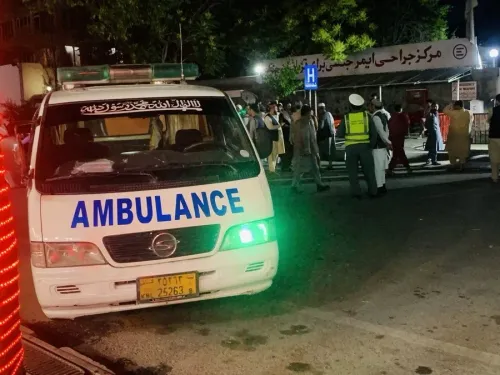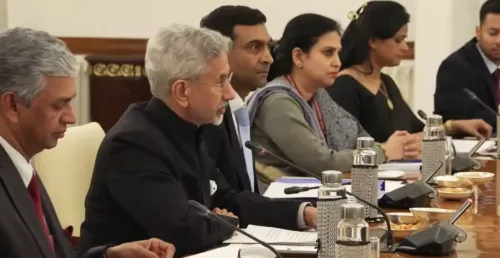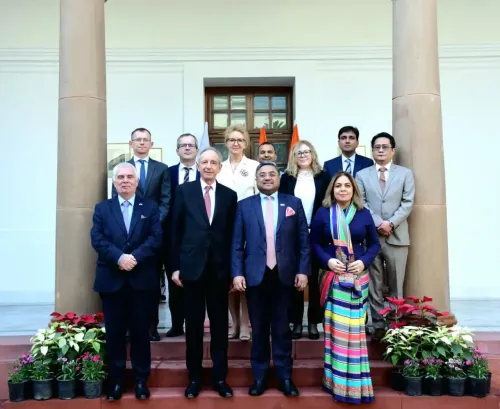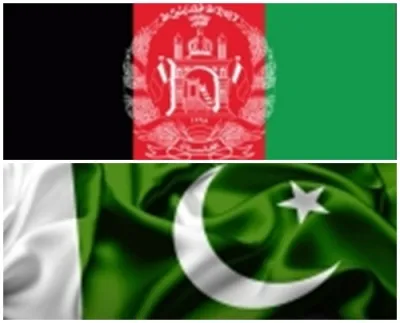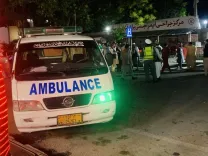Are Airstrikes Testing Pakistan-Afghanistan Relations? India Advocates for Unified Terrorism Response
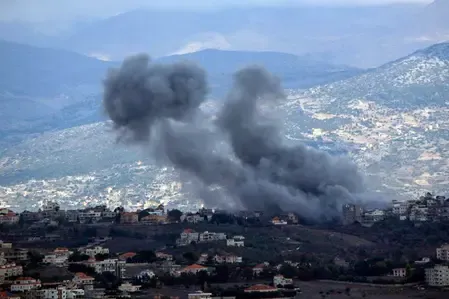
Synopsis
Key Takeaways
- Airstrikes underscore the fragile relations in South Asia.
- India advocates for a unified fight against terrorism.
- Pakistan claims self-defense as its reason for airstrikes.
- The Taliban asserts its right to defend territory.
- Diplomatic dialogue is crucial for regional stability.
Kabul, Oct 12 (NationPress) The ongoing developments following the airstrikes in Kabul are challenging the diplomatic relations between Pakistan and Afghanistan. A recent media report highlights how India has accused Islamabad of jeopardizing regional stability and is urging a unified approach to combat terrorism in all its forms.
Each of the three nations has articulated responses based on their domestic and strategic interests. Despite differing narratives, all sides express a shared commitment to managing the situation to avert further instability, according to a report from the India Narrative.
“The airstrikes by Pakistan in Afghanistan highlight the complex interplay of strategic, security, and diplomatic factors influencing South Asian relations. Afghanistan has requested protection of its sovereignty, while Pakistan cites self-defense as a justification. Meanwhile, India is focused on fostering stability in Afghanistan and advocating for collective action against terrorism,” the report indicates.
Official statements emerging from Kabul, Islamabad, and New Delhi are crucial for understanding the evolving situation and the diplomatic dynamics at play.
On October 9, an explosion was reported in the Abdul Haq Square area of Kabul, close to government facilities and the national intelligence agency.
Pakistan conducted “precision airstrikes in major urban and border regions to disrupt insurgent leadership and hideouts along the Durand Line in Paktika, which were believed to be responsible for the recent attack on Pakistani soil, claiming they acted in self-defense.
The Taliban Ministry of Defence stated there were no casualties but reported damage to civilian areas in Paktika. Zabihulla Mujahid, a spokesperson for the Taliban, reaffirmed Afghanistan’s right to defend its territory and warned that such actions could destabilize the region, calling for a thorough investigation.
Islamabad justified the airstrikes by citing an imminent terrorist threat from Afghan territory. During a press briefing, military spokesperson Lieutenant General Ahmed Sharif Chaudhry emphasized the necessity of these operations for the safety of the Pakistani populace and indicated they would persist as required. He urged Afghanistan to prevent its territory from being used for terrorist activities against Pakistan.
The airstrikes coincided with Amir Khan Muttaqi, the Taliban Foreign Minister, visiting India for six days—a significant event as it marks the first international trip by a Taliban minister since their takeover. He met with Dr S. Jaishankar, the External Affairs Minister, and Ajit Doval, the National Security Advisor.
Following discussions in New Delhi, EAM Jaishankar labeled cross-border terrorism as a joint threat for both India and Afghanistan, critiquing Pakistan’s actions as detrimental to regional stability and advocating for a united front against terrorism.
Dr Jaishankar also reiterated India’s commitment to Afghanistan as a “contiguous neighbor,” emphasizing support for the country's sovereignty, peace, and development.
India’s official statements reflect solidarity with Afghanistan, urging all parties to resolve their disputes through dialogue and diplomatic means.
The recent airstrikes mark a significant escalation in the already fragile relationship between Pakistan and Afghanistan. India’s clear backing of Afghanistan is evident through high-level meetings and joint declarations. Afghanistan remains steadfast in its commitment to territorial integrity and dialogue, while Pakistan defends its military operations as self-defense against terrorism. India continues to advocate for Afghan sovereignty and emphasizes regional collaboration against extremism.


